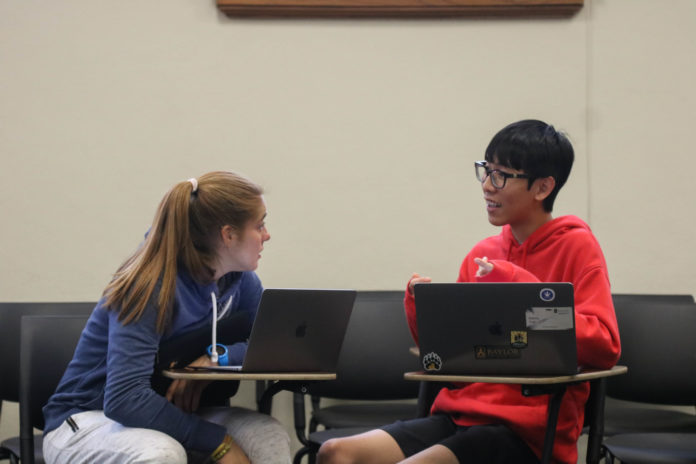
By Savannah Cooper | Reporter
Both cultural and language barriers are being broken on Monday and Wednesday afternoons thanks to an English class for undergraduate and graduate students. English as a Second Language: Composition Skills (ENG 1301) started in fall of 2016 originally for undergraduate students who are granted admission to Baylor based off of their merit, but failed the English placement exam.
ENG 1301 is structured by concept teaching where students are approached with a topics like plagiarism, paraphrasing and transition sentences; given the definition along with examples; then assigned a task using the subject matter.
Temporary full-time English lecturer and Baylor alum Juliet Brown is the sole professor of this course. Her passion for multilingual classes and ability to cater to her students individually helps her classes run smoothly as she teaches what writing in the United States demands.
“What we teach in there are what are the standards and expectations of writing here in the U.S.,” Brown said. “When we think about academic writing, there are different standards across the globe. Not everything is the same. What we focus on in the classroom is what are the expectations of academic and research writing here in the United States. We discuss everything from the basics of writing style and flow and organization, all the way to the more complicated issues of plagiarism and citations. It applies no matter if the student is in physics or economics because these are the American standards.”
In spring of 2017, Baylor’s graduate English department joined in offering this class to graduate students and visiting scholars — resulting in two sections for this unique class. With the undergraduate section enrollment averaging at 15 and the graduate section enrollment capping at 10, Brown is able to give students ample individual attention.
Beijing sophomore Yuqiong “Stella” Jia took Brown’s class her freshman year and truly felt a difference in her confidence to express her opinions in a classroom setting.
“Professor Brown is different from any other professors I’ve had at Baylor,” Jia said. “She doesn’t solely give lectures and is very amiable and energetic. She prefers to share ideas with students through discussion and is always encouraging her students to speak so that we can improve not only our writing skills, but our communication skills as well. I feel like she is a professor that really cares about her students. Her classes are never boring, and I love that she puts in the effort in trying to make the students feel more welcomed.”
While students matriculate through the course, Brown hears their frustrations of feeling like their English is still in its adolescent stage.
“A lot of the time, I’ll hear from my graduate students, ‘I know the knowledge, but when I’m speaking or trying to write about it it feels like an adolescent’,” Brown said. “You know what you want to say, but you’re lacking which is frustrating. I would say that better if I knew the better way to say it.”
Third year Ph.D. student Joseph Thangraj is studying seismology with aspirations of being a scientist. Thangraj earned his undergraduate and masters degrees in India, and through an email he learned about the course and has felt a shift in his proficiency in regards to his writing.
“Before taking the class, I would put multiple paragraphs together,” Thangraj said. “I wasn’t aware that it’s better to keep one idea focused on a paragraph, so that the readers attention is not diverted. I’m in my third year now, but I still use all the things I learned, and I just finished writing a paper. I feel like it’s much easier for me to get those ideas, put them into a structure better now than before.”
With teaching a class of international undergraduate and graduate students, along with visiting scholars, representing a myriad of countries across the world, topics that aren’t writing related come up, and Brown doesn’t shy away from them.
“Spring 2017 was the pilot for the graduate section, and it was right after Trump’s Muslim ban. I had a student in there from one of the countries that was on the list, and they took time in the classroom to discuss their feelings and everyone listened respectfully and other people shared. I expressed how happy I was that this student is in the classroom, and I expanded that to Baylor appreciates you being here and wants you here,” Brown said. “I know that meant a lot to the student because that’s difficult, because even though that’s what you’re hearing I’m glad you’re here, I want you here and they worked hard to be here.”
To learn more about this course and gain Brown’s contact information, click here.





